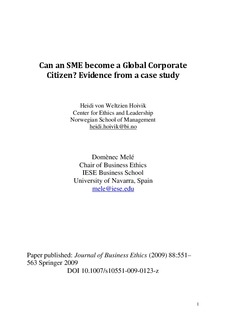| dc.contributor.author | Høivik, Heidi von Weltzien | |
| dc.contributor.author | Melé, Domènec | |
| dc.date.accessioned | 2010-05-10T09:33:35Z | |
| dc.date.available | 2010-05-10T09:33:35Z | |
| dc.date.issued | 2009 | |
| dc.identifier.citation | Journal of Business Ethics, Vol. 88, issue 3 (2009), p. 551-563 | en_US |
| dc.identifier.issn | 0167-4544 | |
| dc.identifier.uri | http://hdl.handle.net/11250/93354 | |
| dc.description.abstract | Global Corporate Citizenship (GCC) continues to become increasingly popular in large corporations. However, this concept has rarely been considered in small and medium size enterprises (SMEs). A case study of a Norwegian clothing company illustrates how GCC can be also applied to small companies. This case study also shows that SMEs can be very innovative in exercising corporate citizenship, without necessarily following the patterns of large multinational companies. The company studied engages as partner in some voluntary labor initiatives promoted by the government, employs people in marginal situations, and exerts influence for the adoption of good working conditions in its supply chain. Environmental issues and actions of solidarity are also considered within a global scope. Ethics of care and concern for specific aspects of the common good seem crucial as GCC drivers in this company, as do personal values, character, and leadership of the owner-manager of the firm. | en_US |
| dc.language.iso | eng | en_US |
| dc.publisher | Springer | en_US |
| dc.title | Can an SME become a global corporate citizen? Evidence from a case study | en_US |
| dc.type | Journal article | en_US |
| dc.type | Peer reviewed | en_US |
| dc.identifier.doi | http://dx.doi.org/10.1007/s10551-009-0123-z | |
